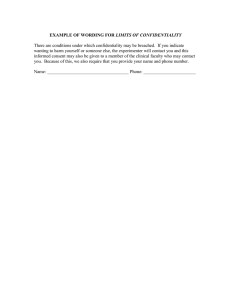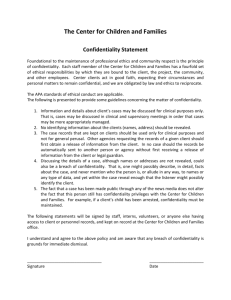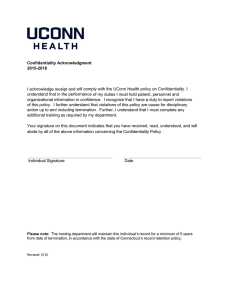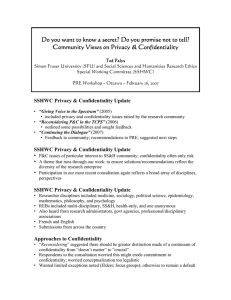Social Sciences and Humanities Research Ethics: Privacy and Confidentiality
advertisement
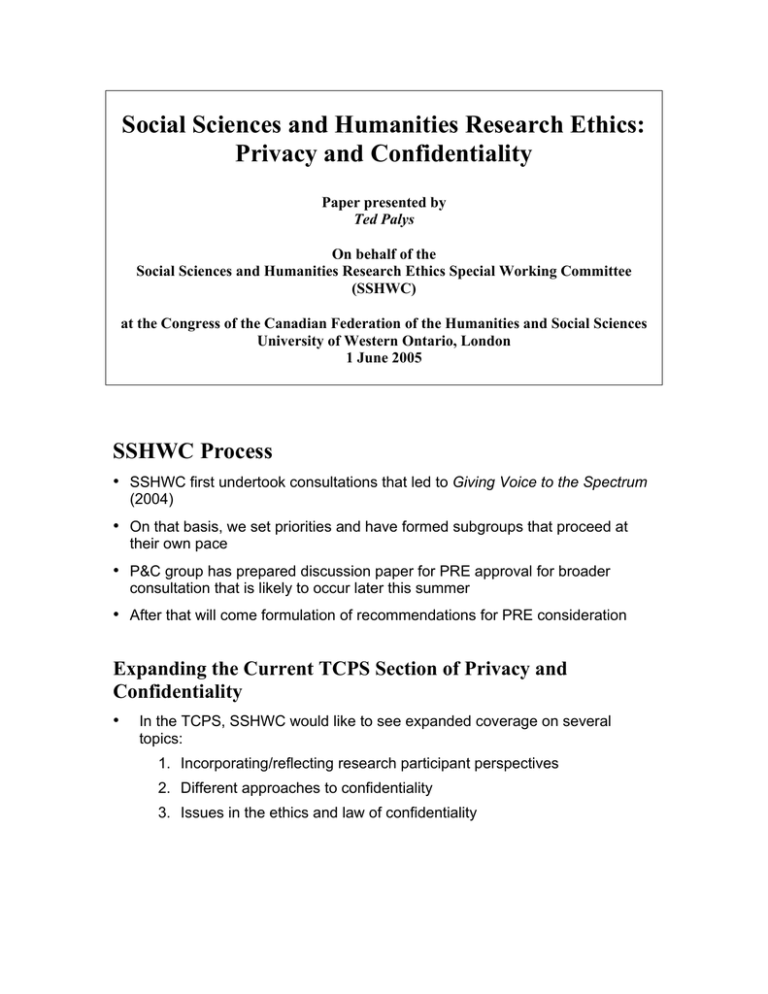
Social Sciences and Humanities Research Ethics: Privacy and Confidentiality Paper presented by Ted Palys On behalf of the Social Sciences and Humanities Research Ethics Special Working Committee (SSHWC) at the Congress of the Canadian Federation of the Humanities and Social Sciences University of Western Ontario, London 1 June 2005 SSHWC Process • SSHWC first undertook consultations that led to Giving Voice to the Spectrum (2004) • On that basis, we set priorities and have formed subgroups that proceed at their own pace • P&C group has prepared discussion paper for PRE approval for broader consultation that is likely to occur later this summer • After that will come formulation of recommendations for PRE consideration Expanding the Current TCPS Section of Privacy and Confidentiality • In the TCPS, SSHWC would like to see expanded coverage on several topics: 1. Incorporating/reflecting research participant perspectives 2. Different approaches to confidentiality 3. Issues in the ethics and law of confidentiality 1. Research Participant Perspectives • TCPS encourages a “subject-centered perspective” • Regarding privacy and confidentiality, these perspectives can inform us in two directions: • Knowing where confidentiality is essential is an important prerequisite to the protection of confidentiality • Knowing where it can be set aside acknowledges diversity while simultaneously underlining its general importance • Is there also a downside? • Can strict adherence to research participant perspectives create ethical problems and/or excessively impede academic freedom? Are new conflicts created? Let us know your views. • An under-researched area • One of our SSHWC subgroups is formulating some exploratory work in this area • Objective: to identify issues and encourage further research in relation to confidentiality and other ethics principles 2. Dimensions of Confidentiality • Although there is always a duty of confidentiality, there should also be clear recognition of diversity across contexts • Confidentiality can range from unnecessary; impossible; out of the researcher’s control; undesirable and even disrespectful; and all the ay to absolutely essential for conducting certain kinds of research • Notwithstanding this diversity, the decision to disclose normally rests with the participant 3. Ethics and Law • Most formidable/worrisome challenges to the ethics of privacy and confidentiality come through legal processes • TCPS asserts confidentiality must be protected at least to the extent possible within the law • Researchers need to understand the legal context in which research confidentiality operates, and their role in its protection 3. Protections • Statute-based protections exist for those at Statistics Canada and “deemed researchers” • Possible protections in common law through the Wigmore criteria • Statute-based protections for some Canadians doing health or criminological research in the United States (but be careful of the implications of the USA Patriots Act for researchers) • Perhaps protection via privacy legislation? Need research to determine this. 3. Challenges • The TCPS notes that “law and ethics may lead to different conclusions.” • Areas where this may occur with respect to research confidentiality include: • Third party challenges via the courts, usually through subpoena • Unanticipated heinous discovery • Mandatory reporting laws 3a. Third Party Challenges • Two major sources of challenge: in the context of criminal prosecutions and civil litigation • TCPS is clear researchers, REBs and institutions have an ethical obligation to defend against threats • In a formal reference, the granting councils assert that • Researchers should make every effort to have ethics and law coincide, but if they “lead to different conclusions,” • Researchers must choose between an “ethics-first” or “law-first” strategy • To try and create a situation where law and ethics coincide: • When information is sensitive and an identifiable third party threat is plausible, researchers should incorporate, and REBs encourage, a maximization of protection occurs via anticipation of the Wigmore criteria • For the researcher, this comes down to: • Making sure the need for confidentiality is explained and documented; • Ensuring the expectation of confidentiality is mutual and clear • “Ethics-first” researchers need to understand what they are getting themselves into, and live up to the pledges they make to participants • “Law-first” researchers • Need to inform participants about this limitation to their pledge, • Must avoid creating a “waiver of privilege” that would undermine the participant’s rights and make confidentiality impossible to defend • Should consider not asking for or recording info that would bring harm to the participant that they would knowingly give up if ordered (see A.M. v Ryan) • Must avoid a research form of “caveat emptor” 3b. Unanticipated Heinous Discovery • “The unanticipated discovery of a prospective harm to an innocent third party that is so heinous that a higher ethic calls for intervention” • More complex an issue than we have seen considered. Not simply “duty to report” • Not always something to be warned of as a limitation to confidentiality • By definition beyond the bounds of the research • The heinous discovery paradox • Many issues: reconciling conflicting roles and standards; competent judgment; “hearsay” • Identifying a minimal “bar” that must be surpassed before the violation of a pledge of confidentiality made in good conscience can be acceptable • The Supreme Court in Smith v Jones said the following made violation “permissible”: • Serious injury or death; and • Imminent; and • Clearly identifiable target • There are still obligations to the participant; the violation should be the minimum necessary to alleviate the prospective harm • Requires case-by-case consideration: • Where there is no time the researcher acts in good conscience • Where there is time, the researcher should discuss alternatives with trusted colleagues 3c. Mandatory Reporting • Many researchers support mandatory reporting provisions, e.g., regarding children in need of protection • Others see this as creating a chill for research that could better inform social policy on these important social problems • What are their respective ethical obligations regarding research participants? • For those who agree with these provisions • We cannot justify, either ethically or methodologically, asking people directly about their involvement in reportable behaviour • When the queries involve the reportable behaviour of third parties, or where it is quite conceivable reportable behaviour might be discussed, researchers must articulate their interpretation of the reporting provisions and inform the participant of these limitations to their confidentiality • Those who disagree with the provisions must deal with the conflict ahead of time by • Arranging a reporting moratorium with appropriate authorities; and/or • Getting legal opinions as to the most conservative interpretation of the reporting requirements; and/or • Initiating efforts to change the law so that it creates the possibility of a research exemption Next Steps • Seeking input through fora like this one; we are eager to hear about other approaches to these issues • A public consultation period on a written document is planned for later this year • Encouraging further research • In the interim, contact us with questions and/or comments at… How To Reach SSHWC: PRE/SRE 350 Albert Street Ottawa, Ontario, K1A 1H5 Tel: (613) 996-0072 Fax: (613) 996-7117 www.pre.ethics.gc.ca sshwc@pre.ethics.gc.ca
